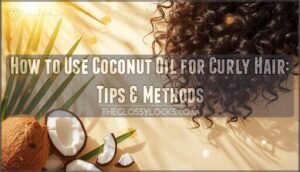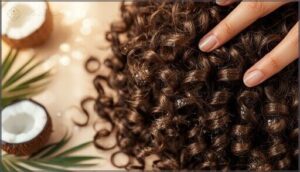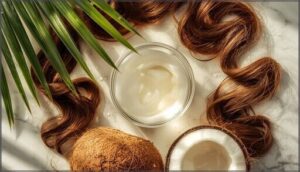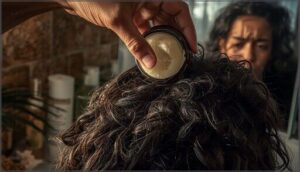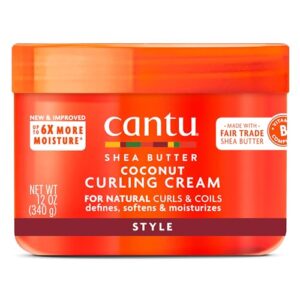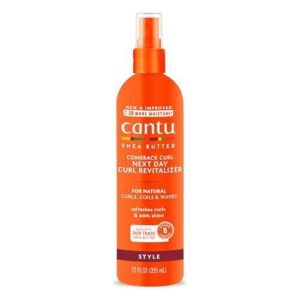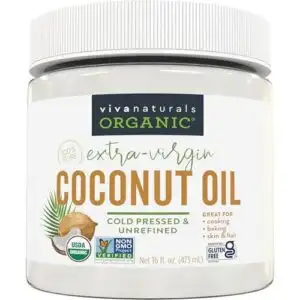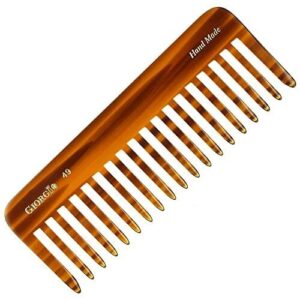This site is supported by our readers. We may earn a commission, at no cost to you, if you purchase through links.
Your curls have their own personality, and they’re not shy about letting you know when something’s off. Too dry, they spring into frizz mode. Too heavy, they lose their bounce and hang limp. Finding that sweet spot where your curls look defined, healthy, and full of life feels like cracking a secret code.
Here’s the thing: coconut oil might just be the key you’ve been searching for. This tropical ingredient doesn’t just sit on top of your strands like most products—it actually penetrates deep into each curl, locking in moisture while building strength from the inside out.
Whether you’re dealing with breakage, battling frizz, or just want your curls to reach their full potential, mastering a few simple coconut oil techniques can transform your entire hair routine.
Table Of Contents
Key Takeaways
- Coconut oil penetrates deep into curly hair thanks to its lauric acid, locking in moisture while strengthening strands from the inside out to reduce breakage and protein loss.
- Apply coconut oil as a pre-shampoo treatment, leave-in conditioner, or overnight mask depending on your hair’s porosity—just remember that less is more to avoid greasy buildup.
- Mix coconut oil with ingredients like almond oil for hydration, lime juice for scalp health, egg white for shine, fenugreek for growth, or aloe vera for damage repair to target specific curl concerns.
- Low porosity hair can struggle with coconut oil since it sits on the surface instead of absorbing, so watch for buildup and consider lighter oils if your curls feel weighed down or greasy.
Why Coconut Oil Benefits Curly Hair
Curly hair craves moisture and strength, and coconut oil delivers both in spades. It’s not just another trendy ingredient—it actually works its way deep into your hair shaft to tackle the issues that matter most.
Here’s why your curls will thank you for adding coconut oil to your routine.
Hydration and Moisture Retention
Here’s the thing about moisture balance: coconut oil doesn’t just sit on your curls, it actually dives in. Thanks to its lauric acid content, it penetrates the hair shaft way better than most oils, locking in water and reducing moisture loss. That’s why it’s a star ingredient in so many DIY hair masks for curly hair, especially when you want deep hydration without the heavy buildup.
If you’ve got high hair porosity, this oil penetration can be a key factor for keeping your curls hydrated and bouncy between washes.
Strengthening and Reducing Breakage
Beyond hydration, you’re protecting your strands from actual damage. Coconut oil reduces protein loss when you use it before shampooing, and that matters because protein loss leads to weakness. Studies show it improves tensile strength and cuticle integrity in damaged hair, giving you better fracture resistance.
Coconut oil protects your curls by reducing protein loss and strengthening hair against breakage and damage
Here’s what that means for your curls:
- Less breakage during detangling and styling sessions
- Stronger hair shaft that can handle mechanical stress
- Fewer split ends and surface micro-cracks over time
Regular coconut oil treatments fortify your curls from the inside out, especially if your hair’s moderately porous. For a full routine that maximizes growth and moisture retention, check out these proven strategies to grow long, healthy hair while keeping your curls nourished.
Frizz Control and Curl Definition
Coconut oil gives you two wins at once: taming frizz and sharpening curl definition. It seals your cuticles to lock moisture in and humidity out, reducing that fluffy halo effect. When you apply a light layer after styling, it smooths each strand and helps curls clump together beautifully.
| Frizz Challenge | How Coconut Oil Helps |
|---|---|
| Humidity swelling | Forms protective barrier against water vapor |
| Rough cuticles | Smooths surface for sleeker strands |
| Curl separation | Enhances alignment and clumping |
| Flyaways | Weighs down unruly strands gently |
| Definition fade | Extends styled curl life between washes |
Your porosity matters here—higher porosity hair responds faster to moisture balance and oil blending for curl enhancement.
Scalp Health and Nourishment
Your scalp deserves as much care as your curls. Coconut oil’s lauric acid fights flakiness while building a healthier scalp barrier.
It penetrates deep into the hair follicle, delivering hair nourishment right where it counts. Regular scalp treatment with this oil keeps moisture balance in check, reducing that tight, itchy feeling.
Think of it as a scalp hydration boost that sets the stage for stronger, shinier hair—oil penetration means coconut oil benefits reach beyond the surface. If you have low porosity hair, though, coconut oil might actually cause buildup instead of sinking in properly.
How to Apply Coconut Oil to Curly Hair
Now that you know why coconut oil works wonders for your curls, let’s talk about the actual techniques that’ll get you those results.
There are several ways to apply coconut oil depending on what your hair needs most, from quick pre-shower treatments to overnight deep conditioning sessions.
Here’s how to make coconut oil work for your unique curl pattern.
Pre-Shampoo (Pre-Poo) Treatment
Want to shield your curls before wash day hits? A pre-poo with coconut oil is your secret weapon for moisture locking and scalp protection.
Here’s how to nail it:
- Warm a tablespoon of coconut oil between your palms, then work it through mid-lengths to ends—don’t forget those thirsty tips.
- Let it sit for 15 minutes to 2 hours, depending on your hair porosity and how much TLC your curls need.
- For extra oil penetration and deep conditioning magic, wrap your head in a warm towel or use a steamer to open up those hair shafts.
- Shampoo as usual—the pre-poo benefits kick in by reducing protein loss and keeping frizz at bay while your regular routine does its thing.
This simple step transforms wash day from a moisture-stripping nightmare into a hair-moisturizing dream for your curly hair.
Leave-in Conditioner Method
After your wash, while your curls are still damp, coconut oil can work wonders as a leave-in conditioner. Just use 1–2 teaspoons on mid-lengths and ends to seal in moisture retention and boost curl definition without the grease.
This lightweight barrier smooths frizz, prevents breakage, and keeps your curls bouncy all day—especially if you’ve got medium to high hair porosity that drinks up moisture fast.
Deep Conditioning Hair Mask
For serious hair repair, a deep conditioning mask with coconut oil is a total breakthrough. Mix 2–3 tablespoons with a dollop of your favorite conditioner, apply it to your curly hair from root to tip, then wrap in a warm towel for 20–30 minutes.
This deep treatment locks moisture into every strand, smooths the cuticle, and leaves your curls softer, stronger, and way easier to detangle.
Scrunching and Finishing Techniques
After your coconut oil treatment, scrunching is your secret weapon for curl definition and frizz control. Flip your head upside down, squeeze small sections upward toward your scalp, then let your curls air-dry or use a diffuser on low heat to lock in that bounce.
- Apply a lightweight coconut curling cream before scrunching for extra hold and frizz reduction
- Use a microfiber towel to blot moisture gently, minimizing friction and flyaways
- Finish with a cold-air blast from your diffuser to seal the cuticle and boost shine
Overnight Nourishing Treatment
Think of overnight treatments as your curls’ spa retreat—maximum absorption time for deep hair hydration. Section damp curly hair, apply a thin layer of coconut oil from mid-length to ends, then wrap in a silk scarf or shower cap.
Six to twelve hours lets the hair mask benefits work their magic, boosting nourishment techniques and moisture retention. Rinse thoroughly in the morning for softer, bouncier spirals.
Best Coconut Oil Combinations for Curly Hair
Coconut oil works wonders on its own, but mixing it with the right ingredients can seriously level up your curly hair game. These combinations target specific issues like dryness, dullness, scalp troubles, and breakage, giving you way better results than coconut oil alone.
Here are five power-packed combos that’ll transform your curls from the roots to the tips.
Coconut Oil and Almond Oil Mask
Dry, coarse curls crave something richer, and that’s where this power duo comes in. Mix equal parts coconut oil and almond oil for a hair mask that delivers deep moisturizing without the heaviness.
Apply it to damp hair, focusing on the ends, and leave it for 30-45 minutes. This oil blend ratio works wonders for natural hair care, giving your curls the hydration they desperately need.
Coconut Oil and Lime Juice for Scalp
Got dandruff or an itchy scalp? Mix two tablespoons of coconut oil with one tablespoon of fresh lime juice for a natural remedy that addresses those issues head-on. The citric acid benefits include scalp exfoliation, while the antifungal properties help restore scalp pH balance and promote scalp health.
Here’s how to use it:
- Massage the mixture into your scalp gently, focusing on problem areas
- Leave it on for 20-30 minutes to moisturize and treat
- Rinse thoroughly with lukewarm water, then shampoo as usual
This combo’s perfect for curly hair care when your scalp needs some extra attention.
Coconut Oil and Egg White for Shine
Want mirror-like shine that turns heads? Whisk one egg white with a tablespoon of coconut oil for a powerful protein repair treatment.
The egg white benefits include cuticle smoothing and hair gloss, while coconut oil delivers deep hair moisturizing.
Apply this shine enhancer to damp curly hair, wait 15-20 minutes, then rinse with cool water. Your curls will thank you with remarkable shine enhancement.
Coconut Oil and Fenugreek for Growth
Looking to boost hair growth and wake up those sleepy follicles? Soak fenugreek seeds overnight, grind them into a paste, and mix with two tablespoons of coconut oil for a powerful scalp treatment.
Fenugreek benefits include hair follicle stimulation and growth enhancement, while coconut oil penetration delivers deep moisture.
Apply this natural hair growth blend to your scalp, massage gently for scalp comfort, wait 30 minutes, then shampoo out for healthier curly hair care.
Coconut Oil and Aloe Vera for Damage
When your curls are fried from heat or chemicals, mix equal parts coconut oil and fresh aloe vera gel for serious damage repair.
This duo handles hair regeneration by sealing in moisture balance while soothing your scalp.
Massage it into damaged sections, wait 20–30 minutes, then rinse for natural hair care that aids follicle health and curly hair growth.
Tips for Using Coconut Oil on Curly Hair
Getting the most out of coconut oil isn’t just about slathering it on and hoping for the best. You need to know your hair’s personality, use the right amount, and wash it out without leaving a greasy mess behind.
Here’s how to nail the basics and avoid the most common coconut oil slip-ups.
Determining Hair Porosity
Before you pour coconut oil all over your curls, you need to understand your hair porosity—how easily your strands absorb and hold moisture. Low porosity hair has a tightly packed cuticle structure that resists moisture absorption, while high porosity soaks it up fast.
Try a simple hair porosity test: drop a clean strand in water. Sinks quickly? High porosity. Floats? Low porosity wins.
Avoiding Greasiness and Weigh-Down
Too much coconut oil turns your curls into a greasy mess, but the fix is simple. Start with just 1–2 teaspoons for medium-length hair—a little goes a long way. Apply only to mid-lengths and ends, skipping your scalp to prevent buildup.
For low porosity hair, try fractionated coconut oil or mix it with a lightweight leave-in to keep your curls bouncy, not weighed down.
How Often to Use Coconut Oil
Generally, you’ll want to use coconut oil once or twice per week as a pre-shampoo treatment on wash days. This frequency gives your curly hair hydration and moisture without causing scalp buildup or greasiness.
- High porosity curls can handle twice-weekly coconut oil application schedules since oil absorption happens faster
- Low porosity hair needs weekly limits—overuse blocks moisture and causes brittleness
- Oily scalps benefit from coconut oil for hair only on ends, not roots
- Dry scalps can apply every few days but alternate with lighter oils between sessions
- Overnight treatments work best once weekly, always followed by thorough shampooing for proper hair care
For best results, consider using coconut oil treatments to improve your curly hair routine.
Washing Out Coconut Oil Effectively
Getting coconut oil out feels tricky, right? Start with warm water rinsing to break down that stubborn residue, then follow with gentle shampooing—twice if needed. For serious residual oil management, a clarifying treatment works wonders on curly hair. Always finish with conditioner to lock in moisture after oil emulsification, keeping your hair care routine balanced and your curls frizz-free without the greasy aftermath.
| Step | Method |
|---|---|
| 1. Pre-Rinse | Use warm water for initial oil emulsification |
| 2. First Cleanse | Apply gentle shampooing to remove coconut oil |
| 3. Second Cleanse | Repeat shampoo for complete coconut oil removal |
| 4. Clarify (if needed) | Use clarifying product for stubborn buildup |
| 5. Condition | Restore moisture and aid detangling post-wash |
Potential Drawbacks and Precautions
Coconut oil isn’t a miracle fix for everyone, and knowing the potential downsides can save you from a bad hair day. Some people run into issues like buildup, breakouts, or hair that just won’t cooperate.
Here’s what to watch out for before you slather it on.
Coconut Oil Sensitivity and Allergies
You mightn’t expect it, but coconut allergies are real—and they can show up as itchy scalp, redness, or even hives. Before slathering coconut oil all over your curly hair, do a quick patch test on your inner arm.
If you notice skin reactions or allergy symptoms, switch to oil alternatives like argan or jojoba for hair care without the risk.
Risk of Scalp Buildup and Flaking
Too much coconut oil can trap dead skin cells and sebum on your scalp, leading to oil accumulation and flaking that looks just like dandruff. This buildup removal challenge happens fast when you skip clarifying shampoos or pile on heavy treatments.
Watch for scalp irritation, itching, or visible flakes—your scalp care tips should include washing thoroughly and applying oil only to your hair strands, not roots.
Issues for Low Porosity Hair
If your hair porosity is low, coconut oil can sit on your tight cuticle layer instead of sinking in, blocking moisture uptake and creating stubborn product buildup. You’ll notice:
- Slick, greasy strands that won’t absorb treatments
- Flat curls weighed down by surface oil
- Scalp irritation from trapped residue
Switch to lighter oils or heat-assisted moisturizing sessions for better results.
Acne and Skin Concerns
When coconut oil drips onto your face or forehead, it can trigger breakouts. Its high comedogenicity clogs pores and traps bacteria, sparking acne flares and facial inflammation. Studies link it to folliculitis and skin irritation in sensitive folks.
If you’re acne-prone, keep application away from your hairline, wash hands after styling, and patch-test first to dodge pore-clogging disasters.
Top Coconut Oil Products for Curly Hair
You don’t need to hunt down pure coconut oil and DIY everything, there are some seriously good products out there that do the heavy lifting for you.
These picks combine coconut oil with other curl-friendly ingredients to give you hydration, definition, and manageability without the guesswork.
Let’s break down the top products that’ll make your curly hair routine way easier.
1. Cantu Coconut Curling Cream
You’ve probably scrolled past Cantu Coconut Curling Cream a hundred times, but here’s why it deserves a spot in your routine. This award-winning formula blends lightweight shea butter with coconut oil and seven essential oils to define your curls without the crunch.
It’s perfect for Type 3 and 4 textures, delivering moisture that actually lasts. Plus, it’s free from sulfates, parabens, and silicones—so you’re feeding your curls real nourishment, not filler.
Just remember, a little goes a long way to avoid greasiness.
| Best For | Anyone with Type 3 curls or Type 4 coils looking for lasting moisture and frizz control without harsh chemicals. |
|---|---|
| Primary Use | Curl defining cream |
| Hair Type | Type 3-4 curls |
| Key Ingredient | Coconut oil & shea butter |
| Cruelty-Free | Yes |
| Size | 12 oz |
| Scent | Coconut |
| Additional Features |
|
- Defines curls with a lightweight blend of shea butter, coconut oil, and essential oils that won’t weigh hair down
- Free from sulfates, parabens, silicones, and other harsh ingredients—just clean nourishment for your hair
- Works across multiple curl patterns (3A to 4C) and doubles as a quick refresh for dry ends between wash days
- Can feel too heavy or greasy on finer hair types if you use more than a pea-sized amount
- May cause white flakes or buildup on the scalp with excessive application or over time
- Not ideal for sensitive scalps, and requires careful dosing to avoid crunchiness or weighed-down curls
2. Cantu Curl Revitalizer Mist
When your curls need a quick boost between washes, this Cantu mist is your secret weapon. The 12 oz bottle combines coconut oil with shea butter and castor oil to refresh curls without weighing them down.
Just spritz it on damp or dry hair, scrunch gently, and watch your texture spring back to life. It controls frizz and helps with detangling in seconds.
Fair warning though—some users find the nozzle sprays more like a stream than a true mist, so test it first before dousing your whole head.
| Best For | People with Type 3 curls or Type 4 coils who want a lightweight refresh between wash days without heavy creams or gels. |
|---|---|
| Primary Use | Curl reviving spray |
| Hair Type | Type 3-4 curls |
| Key Ingredient | Shea butter & castor oil |
| Cruelty-Free | Yes |
| Size | 12 fl oz |
| Scent | Coconut |
| Additional Features |
|
- Shea butter and castor oil combo adds moisture and shine while keeping curls bouncy and defined
- Works on both damp and dry hair, making it versatile for morning touch-ups or mid-day frizz control
- Free from sulfates, parabens, and mineral oil, plus it’s cruelty-free
- The spray nozzle can be inconsistent—sometimes it shoots a stream instead of a fine mist
- Some users with certain hair types find it leaves hair feeling sticky or doesn’t absorb well
- May not work for everyone, especially if your hair doesn’t respond well to coconut-based products
3. Viva Naturals Organic Coconut Oil
Looking for a pure, multi-purpose option? Viva Naturals Organic Coconut Oil is cold-pressed and USDA certified, giving you 16 fluid ounces of unrefined goodness for your hair care routine.
This organic ingredient powerhouse works as a pre-poo treatment, deep conditioner, or scalp moisturizer—no additives, just natural hair products at their finest.
The coconut sourcing methods guarantee quality lauric acid that penetrates your curls deeply. Just remember, it solidifies below 75°F, so warm it between your palms first for easier application.
| Best For | People who want a pure, versatile coconut oil that works for both hair care and cooking without any added chemicals or processing. |
|---|---|
| Primary Use | Multi-purpose oil |
| Hair Type | All hair types |
| Key Ingredient | Virgin coconut oil |
| Cruelty-Free | Not specified |
| Size | 16 fl oz |
| Scent | Coconut |
| Additional Features |
|
- Cold-pressed and USDA organic certified, so you’re getting unrefined coconut oil with all the natural lauric acid intact
- Works as a multi-tasker—use it as a pre-poo treatment, deep conditioner, scalp oil, or even in the kitchen for cooking and baking
- No additives or preservatives, just 100% pure coconut oil in a BPA-free or glass container
- Solidifies below 75°F, so you’ll need to warm it up between your palms before each use
- The rich coconut scent might not work for everyone, especially if you’re sensitive to strong smells
- Can cause buildup or greasiness on fine or low-porosity hair if you use too much at once
4. Giorgio Large Detangling Comb
When you’re working coconut oil through your curls, the right tool makes all the difference. The Giorgio Large Detangling Comb features 5.75-inch wide tooth benefits that glide through thick, wavy textures without snagging or causing frizz.
Its handmade cellulose acetate construction and rounded tips protect your scalp during gentle detangling sessions. Start at the ends and work upward on damp hair—pair it with your favorite leave-in for maximum slip.
This curly hair care essential helps distribute product evenly while preserving your curl pattern and minimizing breakage.
| Best For | People with thick, curly, or wavy hair who need a gentle detangling comb that works well with oils and conditioners without causing breakage. |
|---|---|
| Primary Use | Detangling comb |
| Hair Type | All hair types |
| Key Ingredient | Cellulose acetate |
| Cruelty-Free | Not specified |
| Size | 5.75 inches |
| Scent | Unscented |
| Additional Features |
|
- Wide-set teeth and rounded tips glide through curls without snagging, reducing frizz and protecting your scalp during detangling
- Handmade cellulose acetate construction is durable and flexible, making it gentle on wet or damp hair while distributing products evenly
- Works effectively on all hair types including extensions and wigs, helping maintain volume and curl pattern from roots to ends
- The comb can be brittle and may break if dropped, despite being marketed as long-lasting
- Some users find it smaller than expected at 5.75 inches, which might require working through very thick hair in smaller sections
- The rigid construction means it’s less forgiving on severe tangles compared to more flexible detangling tools
Frequently Asked Questions (FAQs)
Can coconut oil lead to scalp buildup or flaking?
Yes, heavy application can trap dead skin cells and debris, creating buildup that mimics dandruff. However, light use with regular gentle cleansing actually promotes scalp health—the key is finding your sweet spot.
Can coconut oil help with heat damage repair?
Coconut oil won’t repair broken bonds from heat, but it does lock in moisture and reduce hair protein loss during washing.
Think of it as damage prevention rather than a true fix for thermal destruction.
Does coconut oil prevent split ends in curls?
Let’s split hairs here: yes, coconut oil can help prevent split ends in curls by reducing protein loss and breakage.
It strengthens hair shafts, offers frizz reduction methods, and aids hair damage repair when used consistently.
Is refined or unrefined coconut oil better for curls?
Both forms work well, but unrefined virgin coconut oil packs more natural phytonutrients for deep nourishment. Refined coconut oil feels lighter and won’t irritate sensitive scalps.
Your hair porosity and scalp sensitivity make the call.
Can coconut oil protect hair from sun damage?
While coconut oil offers moisture and hair health benefits, it doesn’t provide real solar defense against UV damage. For curly hair protection from sun exposure, pair it with a proper SPF spray or hat.
Researchers rely on scientific study summaries to evaluate the effectiveness of various hair care treatments.
Conclusion
Think of coconut oil for curly hair as your personal hair architect—it doesn’t just coat the surface, it rebuilds from within. You’ve got the methods, the combinations, and the insider tricks to avoid every pitfall.
Now it’s about showing up consistently and letting your curls do what they were born to do: steal the show. Stop second-guessing and start experimenting. Your healthiest, most defined curls are waiting on the other side of that jar.
- https://www.sciencedirect.com/science/article/pii/S0749208123000268
- https://pmc.ncbi.nlm.nih.gov/articles/PMC11667938/
- https://www.blogger.com/blogin?u=https://www.blogger.com/blogin?u=https://www.thecrunchychicken.com/2008/07/going-nuts-for-coconut-oil.html
- https://www.hsph.harvard.edu/nutritionsource/food-features/coconut-oil/
- https://www.webmd.com/beauty/health-benefits-of-coconut-oil-for-hair

